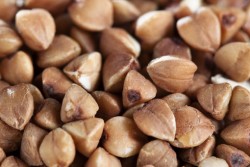Better Than Grains
Home » Better Than Grains
Why Buckwheat Is Better Than Grains
- More vitamins and minerals. Compared with true grains, buckwheat is high in minerals: especially zinc, copper and manganese.
- Healthier fat profile. Unlike true grains, buckwheat's low-fat content is skewed toward monounsaturated fatty acids—the type that makes olive oil so heart-healthful.
- Healthier starch and fiber profile. The fiber in true grains other than barley is largely insoluble, while a considerable portion of buckwheat dietary fiber is the soluble type that makes oats so heart-healthful and yields digestion byproducts that reduce blood cholesterol levels and the risk of colon cancer. Buckwheat is also high in "resistant starch," which also enhances colon health, and serves to reduce blood sugar levels.
- Reduces high blood pressure and LDL (bad) cholesterol and discourages obesity. Most recently, a buckwheat extract substantially reduced blood glucose levels in diabetic rats: a promising finding that should lead to similar research in human diabetics. This blood sugar benefit is attributed in part to rare carbohydrate compounds called fagopyritols (especially D-chiro-inositol), of which buckwheat is by far the richest food source yet discovered.
- Contains flavonoids for heart and circulatory health. In addition to its marked nutritional benefits, buckwheat has been traditionally prized as a "blood-building" food. Modern science attributes this ancient reputation to buckwheat's high levels of antioxidant polyphenols—especially rutin (a bioflavonoid), which supports the circulatory system and helps preventing recurrent bleeding caused by weakened blood vessels, as in hemorrhoids and varicose veins. Finally, rutin acts as an ACE inhibitor and contributes to buckwheat's ability to reduce high blood pressure.

Buckwheat is not actually a grain
Though typically buckwheat is considered a grain, it’s actually a seed – and completely gluten-free and unrelated to wheat. Buckwheat should be a pantry essential for those with coeliac disease or those who have gone gluten-free for personal health reasons.
So it’s a popular substitute for wheat for those who are gluten-intolerant. Nutritionally, buckwheat surpasses rice, wheat and corn on almost every level of nutrient density, especially when it comes to protein. Buckwheat is a pretty good source of plant protein, 1 cup will give you about 23 grams.
Buckwheat contains higher levels of zinc, copper, and manganese than other cereal grains, and the bioavailability of zinc, copper, and potassium from buckwheat is also quite high.
So if you’re not able to eat oats, but love porridge or overnight oats, you can easily achieve the same delicious result with buckwheat.






